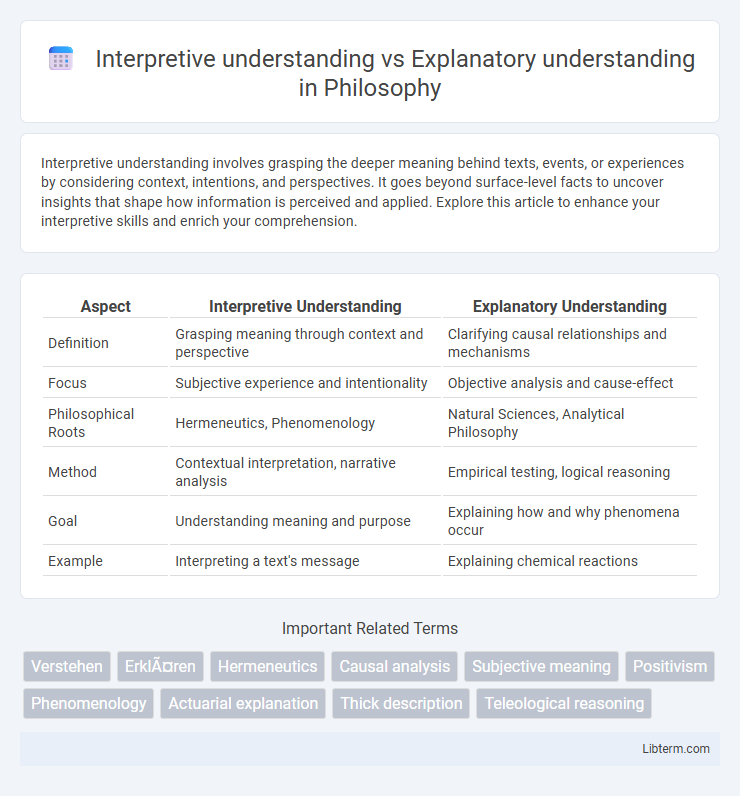Interpretive understanding involves grasping the deeper meaning behind texts, events, or experiences by considering context, intentions, and perspectives. It goes beyond surface-level facts to uncover insights that shape how information is perceived and applied. Explore this article to enhance your interpretive skills and enrich your comprehension.
Table of Comparison
| Aspect | Interpretive Understanding | Explanatory Understanding |
|---|---|---|
| Definition | Grasping meaning through context and perspective | Clarifying causal relationships and mechanisms |
| Focus | Subjective experience and intentionality | Objective analysis and cause-effect |
| Philosophical Roots | Hermeneutics, Phenomenology | Natural Sciences, Analytical Philosophy |
| Method | Contextual interpretation, narrative analysis | Empirical testing, logical reasoning |
| Goal | Understanding meaning and purpose | Explaining how and why phenomena occur |
| Example | Interpreting a text's message | Explaining chemical reactions |
Introduction to Interpretive and Explanatory Understanding
Interpretive understanding involves grasping the meaning and context behind actions or events, focusing on subjective experiences and intentions. Explanatory understanding aims to identify causal relationships and objective reasons, often using empirical evidence to clarify why phenomena occur. Both approaches are essential in social sciences for comprehensively analyzing human behavior and social processes.
Defining Interpretive Understanding
Interpretive understanding involves grasping the meaning, context, and subjective experiences behind actions or texts, emphasizing empathy and insight into human intentions. It contrasts with explanatory understanding, which seeks causal relationships and objective reasons behind phenomena. Defining interpretive understanding centers on comprehending symbolic significance and the lived experiences that shape individual or cultural narratives.
Defining Explanatory Understanding
Explanatory understanding involves identifying causal relationships and underlying mechanisms that explain why a phenomenon occurs, emphasizing objective analysis and generalizable principles. It contrasts with interpretive understanding, which focuses on grasping subjective meanings and perspectives within specific contexts. Defining explanatory understanding centers on providing scientific, evidence-based explanations that reveal how and why processes function.
Historical Perspectives on Understanding
Interpretive understanding emphasizes grasping the meanings and intentions behind historical events, prioritizing subjective context and the perspectives of historical actors. Explanatory understanding seeks to establish causal relationships and objective explanations rooted in empirical evidence and generalizable theories. Historians often balance these approaches by integrating narrative interpretation with analytical explanation to provide a comprehensive understanding of past phenomena.
Key Differences Between Interpretive and Explanatory Approaches
Interpretive understanding emphasizes the subjective meaning and context behind human actions, focusing on how individuals make sense of their experiences within specific cultural or social settings. Explanatory understanding seeks to identify generalizable causal relationships and objective mechanisms, aiming to predict and explain phenomena through empirical evidence and scientific methods. Key differences include interpretive's focus on depth and context versus explanatory's emphasis on breadth and causality, as well as the use of qualitative analysis in interpretive approaches compared to quantitative data in explanatory research.
Applications in Scientific Research
Interpretive understanding in scientific research involves comprehending the meaning and context behind data, often used in qualitative studies such as ethnography or phenomenology to explore human behavior and social processes. Explanatory understanding focuses on identifying causal relationships and mechanisms, typically applied in quantitative research to test hypotheses and predict outcomes using statistical models. Combining both approaches enhances research by providing a comprehensive view that captures both the depth of subjective experience and the rigor of objective analysis.
Role in Social Sciences and Humanities
Interpretive understanding in social sciences and humanities emphasizes grasping the subjective meanings and cultural contexts behind human behavior, enabling researchers to appreciate individual perspectives and social phenomena. Explanatory understanding focuses on identifying causal relationships and general laws that account for patterns observed in social systems, aiming for predictive power and systematic analysis. Both approaches complement each other by balancing rich contextual insights with structured explanations, enhancing comprehensive knowledge of social realities.
Methodologies for Interpretive Understanding
Interpretive understanding relies on qualitative methodologies such as hermeneutics, phenomenology, and ethnography to grasp the meaning of social phenomena from the participants' perspectives. These methods emphasize context, subjective experience, and the co-construction of meaning, often employing techniques like in-depth interviews, participant observation, and narrative analysis. Unlike explanatory understanding, which seeks causal relationships through quantitative data and hypothesis testing, interpretive methodologies prioritize rich, detailed descriptions to uncover the complexity and nuance of human behavior.
Methodologies for Explanatory Understanding
Explanatory understanding employs methodologies such as causal analysis, hypothesis testing, and experimental design to uncover underlying mechanisms and cause-effect relationships within phenomena. Techniques like quantitative modeling, statistical inference, and controlled experimentation provide systematic frameworks to validate explanations and predict outcomes. These approaches prioritize objective evaluation and reproducibility, distinguishing explanatory understanding from the more context-dependent, meaning-focused nature of interpretive understanding.
Choosing the Right Approach for Your Inquiry
Interpretive understanding emphasizes grasping the meaning and context behind human actions and social phenomena, making it ideal for qualitative research focusing on subjective experiences. Explanatory understanding seeks to identify causal relationships and generalizable laws, suited for quantitative research aiming to predict or explain outcomes. Choosing the right approach depends on whether your inquiry prioritizes depth of insight into meanings or seeks broad, testable explanations.
Interpretive understanding Infographic

 libterm.com
libterm.com